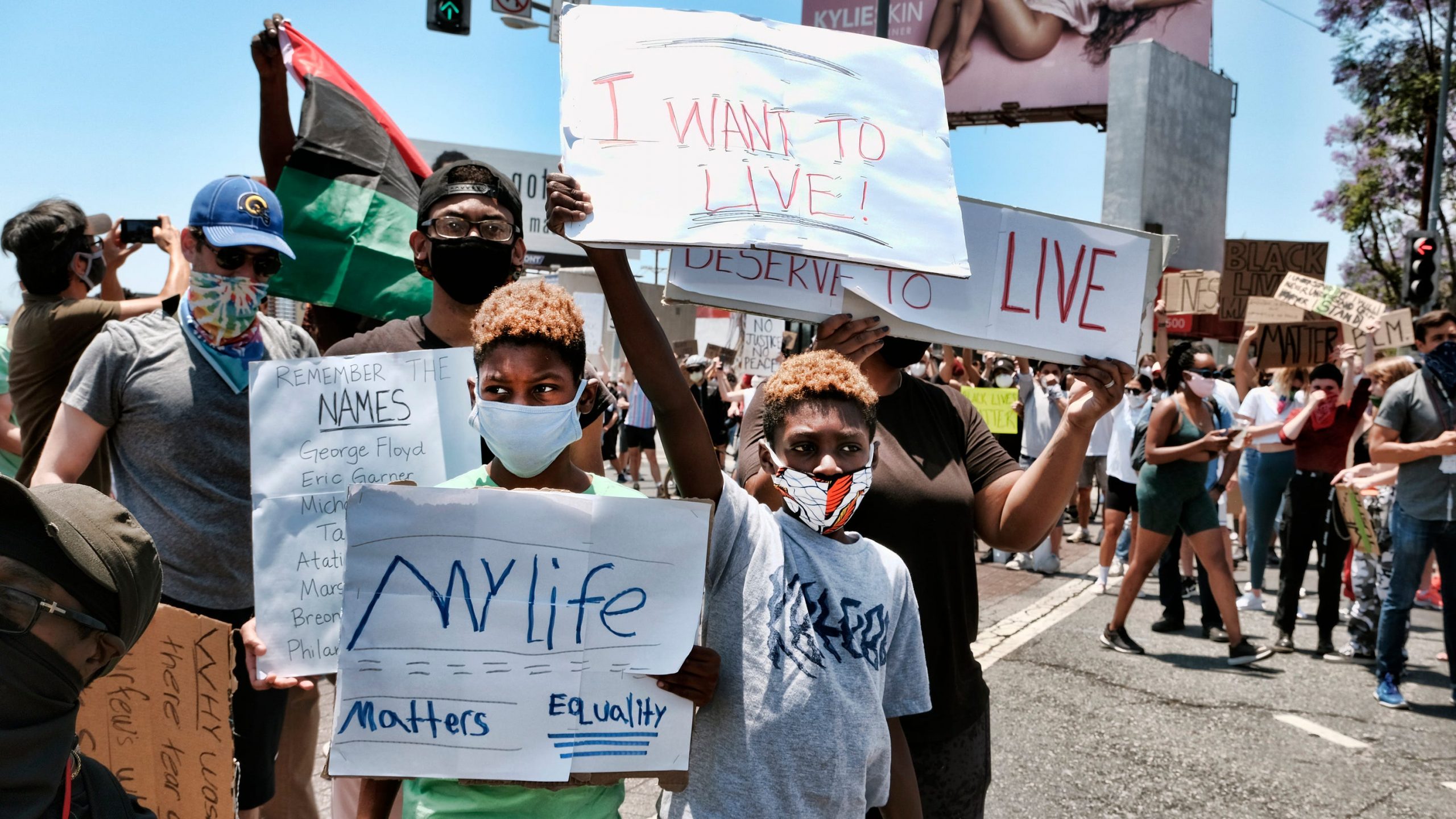CLOSE![]()
A veto-proof majority of the Minneapolis City Council committed to dismantling its police department after the death of George Floyd.
USA TODAY
AUSTIN – If she sees a crime being committed, Ishia Lynette is more likely to call her father than police.
Her reluctance to turn to law enforcement for protection stems from growing up half black and half Mexican in El Paso, Texas, and witnessing her African American father arrested – twice – for minor traffic violations and relatives harassed by police.
“From very early on, I was fearful of the police,” said Lynette, 30, who now lives in Austin and works with the Austin Justice Coalition, which advocates for police reform and accountability. “I can’t think of a time when I called the police unless it was very necessary — like a murder.”
Global protests in the wake of George Floyd’s May 25 death have called for massive overhauls of police,with some groups demanding that American cities defund police departments. Many law enforcement agencies embrace a mission to “protect and serve” but the debate over police brutality and funding has raised questions about just who these departments keep safe.
Police departments have a long history of violence and aggression toward many minority communities in the U.S., including Latino, Muslim, LGBTQ and Black Americans, creating a deep mistrust of police that has resulted in many minority communities already under-using police departments because they are reluctant to call them for help.
Police relations in black communities have been at the center of worldwide protests, ever sinceFloyd, 46, who is black, was pinned to the ground in Minneapolis by officers after being accused of passing a fake $20 bill at a grocery store. In a video of the encounter, Floyd gasped for breath as officer Derek Chauvin kneeled on his neck for nearly nine minutes while three other officers looked on.
Other minority groups, such as Latino and LGBTQ Americans, have also faced decades of strained relations with police and are hesitant to call on them, according to experts, activists and studies.
Recent cases include:
- Tony McDade, a 38-year-old transgender man, was shot and killed by Tallahassee police two days after Floyd was killed.
- Mike Ramos, 42, who was shot and killed in April by Austin police after they answered a call of people doing drugs in an apartment complex parking lot. Police later said he didn’t have a gun.
- Earlier this month, California Highway Patrol officers repeatedly shot Erik Salgado, 23, after a traffic stop. His pregnant girlfriend survived but was severely injured.
Fear of police in African American communities could be traced back generations to “slave patrols” that worked with sheriff’s departments across the South to capture and terrorize runaway slaves, said David J. Thomas, a criminologist at Florida Gulf Coast University and retired veteran police officer. Through the years, departments have attempted reforms – such as hiring more minority officers – but those efforts have fallen short of restoring confidence to black communities, he said.
The Department of Justice under Barack Obama launched a series of lawsuits and consent decrees on police departments known to have civil rights violations. But those efforts all but vanished under President Donald Trump, he said.
“There’s nobody that oversees local law enforcement when they run amok,” Thomas said. “Law enforcement without oversight is a very dangerous thing.”
Autoplay
Show Thumbnails
Show Captions
Alexander Weiss, an expert on police staffing who has helped reform police departments in major U.S. cities, said that distrust of police — especially after publicized incidents of police brutality — often leads to minority communities refusing to call police for help, further endangering those neighborhoods.
A study by his consulting firm in February in Baltimore showed that white, affluent areas of the city called on police more than twice the number of times as neighborhoods populated by minority groups.
“It’s one of the biggest challenges here,” Weiss said.
A 2013 PolicyLink/University of Illinois at Chicago study revealed that 32% of U.S.-born Latinos would rather tell a church or community leader about a crime than law enforcement. That number rises to 50% for foreign-born Latinos.
“The Latino community is mistrusting and actually fearful of some of the police in their communities,” said Claudia Ruiz, a policy analyst with UnidosUS, a Washington-based Latino advocacy group. “Latinos have some of the lowest reporting statistics in the U.S.”
One of the biggest barriers in improving relations and avoiding civil rights violations in Latino communities is lack of good data, Ruiz said. Local law enforcement agencies often include race but not ethnicity in arrest records, a discrepancy UnidosUS is lobbying Washington to fix, she said.
“It’s very hard to call for changes in how law enforcement interacts with Latinos when the data is not complete,” Ruiz said.
Blacks and Latinos are not the only groups that have complained of police mistreatment. In 2017, a New York federal judge approved a settlement that protected Muslims and others from New York Police Department investigations into political or religious activity. The agreement stemmed from lawsuits that accused the NYPD of illegally surveying Muslims in the wake of the 911 terrorist attacks.
To repair mistrust between police and minority communities, police officials have been bolstering training among their ranks and encouraging more hiring of minority officers, said Cindy Rodriguez, president of the National Latino Peace Officers Association.
Her group offers training to departments around the U.S. that encourage inclusiveness, both inside and outside of agencies, she said. Rodriguez said she’s also encouraged by NLPOA’s growing size: In the past four years, the group has welcomed 600 new members and grown by 12 chapters.
Those minority officers go into neighborhoods and bridge a lot of gaps, she said.
“That’s how you gain the trust,” Rodriguez said. “It’s going into the community and doing things.”
The modern fight for LGBTQ rights in the U.S. began with a response to police brutality: the 1969 Stonewall riots. Violent street demonstrations erupted on the streets of New York City after an early morning police raid on June 28, 1969, at the Stonehall Inn in Greenwich Village, a popular hangout for the area’s gay men and lesbians. Today, popular LGBTQ Pride events are held toward the end of June to mark the Stonewall riots.
Through the years, new laws and police practices have improved police reaction to LGBTQ rights, but widespread harassment and discrimination still exists in the community at the hands of police, said Avatara Smith-Carrington, a law fellow at Lambda Legal, a New York-based organization that supports LGBTQ rights.
And people in the LGBTQ community who are also black or brown often receive even harsher treatment from police, Smith-Carrington said. Many of them are reluctant to call police to report crimes for fear of being harassed themselves, Smith-Carrington said.
In a 2012 study released by Legal Lambda, 73% of those surveyed reported having some face-to-face encounter with police over the previous five years and 21% said police had been hostile toward them. Another 14% of respondents reported being verbally assaulted by police, according to the study.
One gay man in the study reported being called a homophobic slur and beat up by police in Washington, D.C., then charged with assaulting them and forced to plead guilty to being under the influence of his HIV medication.
The recent protests sparked by Floyd’s death are a good opportunity to shine an equally bright light on LGBTQ rights, Smith-Carrington said.
Autoplay
Show Thumbnails
Show Captions
“The beauty of this movement right now is that it’s elevating and amplifying the harm that happens to communities of color,” they said. “These same incidents of violence at the hands of police also happen to LGBTQ people across the spectrum.”
In Austin, Brenda Ramos, Mike Ramos’s mother, has been speaking at rallies drawing thousands of protesters following Floyd’s death, raising awareness of police brutality on people of all races and colors.
“My son, Mike, my baby, was shot and killed by Austin police officer Christopher Taylor one month ago. I cried every day,” she said at a May 31 gathering alongside parents of other slain victims. “Now, I’m in this terrible heartbreaking club. It’s a club of mothers of black Americans who have been murdered by police.”
Lynette, the Austin activist, said she doesn’t agree with completely abolishing police but does think many of the millions of dollars that go into paying for more officers and weapons could be better used toward eradicating homelessness, improving mental health and overall empowering communities historically weary of police.
“We will keep having the same issue as to how minority communities interact with police until we can build that trust back up,” she said. “At this point, it’s gone.”
Follow Jervis on Twitter: @MrRJervis.
Read or Share this story: https://www.usatoday.com/story/news/nation/2020/06/13/mistrust-police-minority-communities-hesitant-call-police-george-floyd/5347878002/







where can i get clomiphene without prescription how to buy generic clomiphene no prescription can i get cheap clomid tablets order clomiphene pill how to buy cheap clomiphene no prescription how can i get generic clomid tablets can you buy cheap clomid online
More posts like this would make the blogosphere more useful.
More posts like this would create the online play more useful.
azithromycin cheap – metronidazole 200mg tablet flagyl 200mg ca
buy rybelsus pills – purchase semaglutide without prescription buy cyproheptadine online
buy motilium tablets – cyclobenzaprine 15mg sale purchase flexeril
buy inderal 20mg generic – buy methotrexate order methotrexate 10mg sale
amoxicillin oral – combivent 100 mcg cost brand combivent 100 mcg
order zithromax sale – cost tindamax 500mg purchase nebivolol for sale
order augmentin 375mg generic – https://atbioinfo.com/ ampicillin uk
buy nexium no prescription – anexa mate buy esomeprazole generic
… [Trackback]
[…] Info to that Topic: famousreporters.com/who-are-police-protecting-and-serving-law-enforcement-has-history-of-violence-against-many-minority-groups/ […]
medex where to buy – https://coumamide.com/ purchase cozaar generic
mobic over the counter – https://moboxsin.com/ meloxicam 7.5mg canada
order prednisone 5mg for sale – aprep lson deltasone brand
ed pills where to buy – https://fastedtotake.com/ herbal ed pills
where to buy amoxil without a prescription – cheap amoxil online amoxicillin medication
… [Trackback]
[…] Find More to that Topic: famousreporters.com/who-are-police-protecting-and-serving-law-enforcement-has-history-of-violence-against-many-minority-groups/ […]
forcan medication – https://gpdifluca.com/# diflucan 200mg ca
cenforce drug – buy cenforce 100mg pill purchase cenforce
cialis next day delivery – this pictures of cialis
buy liquid tadalafil online – does tadalafil work cialis directions
order zantac 150mg sale – https://aranitidine.com/ purchase ranitidine generic
viagra buy sri lanka – click where can i buy viagra online yahoo answers
Greetings! Utter gainful recommendation within this article! It’s the scarcely changes which choice espy the largest changes. Thanks a lot quest of sharing! sitio web
I am in fact thrilled to coup d’oeil at this blog posts which consists of tons of profitable facts, thanks representing providing such data. order accutane 20mg
Thanks an eye to sharing. It’s first quality. https://ursxdol.com/synthroid-available-online/
Proof blog you possess here.. It’s severely to on elevated calibre script like yours these days. I honestly respect individuals like you! Go through vigilance!! https://prohnrg.com/
Thanks on putting this up. It’s okay done. https://aranitidine.com/fr/sibelium/
I’ll certainly return to read more. https://ondactone.com/spironolactone/
More peace pieces like this would create the интернет better.
plavix 150mg generic
This is the gentle of literature I truly appreciate. http://mi.minfish.com/home.php?mod=space&uid=1412624
order dapagliflozin 10mg online – https://janozin.com/# forxiga 10mg pills
xenical online – https://asacostat.com/# buy xenical 60mg without prescription
The sagacity in this ruined is exceptional. https://sportavesti.ru/forums/users/pnkpi-2/
You can keep yourself and your ancestors nearby being heedful when buying panacea online. Some pharmaceutics websites manipulate legally and provide convenience, secretiveness, bring in savings and safeguards over the extent of purchasing medicines. buy in TerbinaPharmacy https://terbinafines.com/product/inderal.html inderal
More peace pieces like this would create the интернет better. vibra-tabs medication
This website exceedingly has all of the tidings and facts I needed about this case and didn’t comprehend who to ask.
the best online casino
top casino sites casinos
best casino online real money
mgm free bet betmgm NJ betmgm Delaware